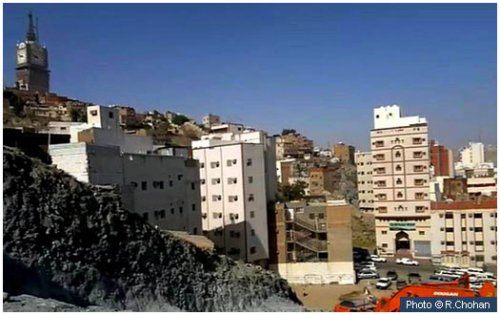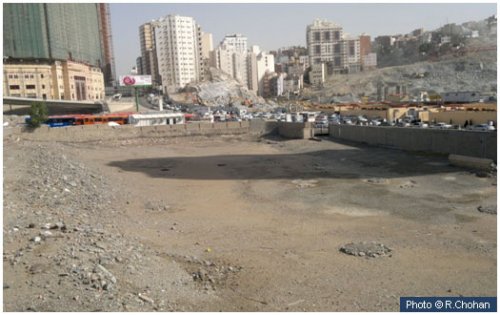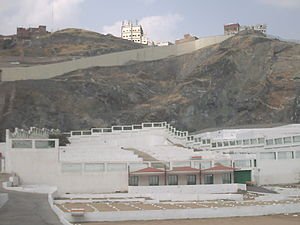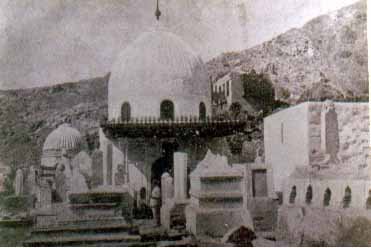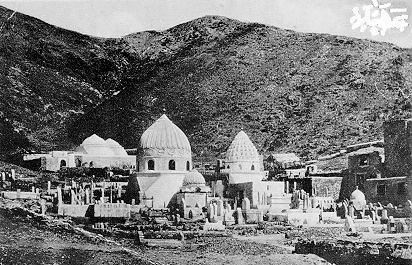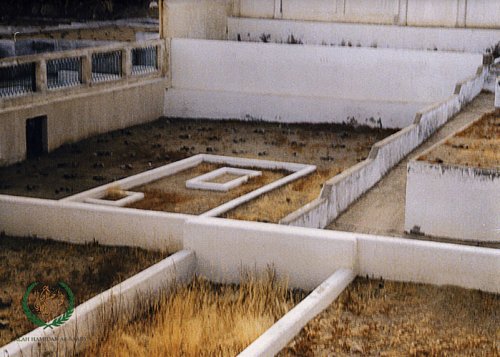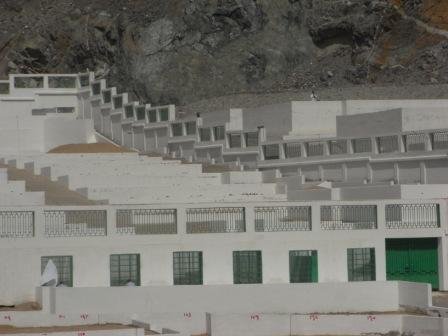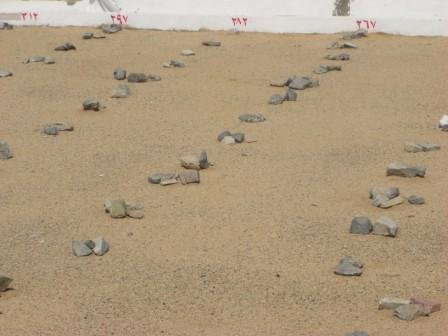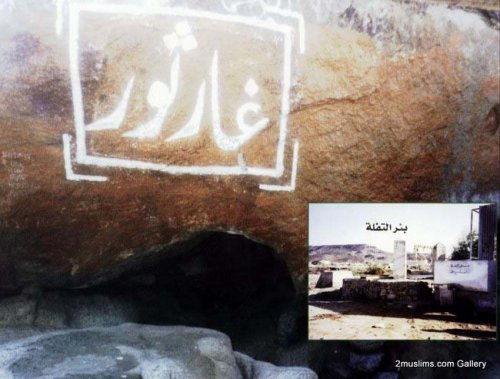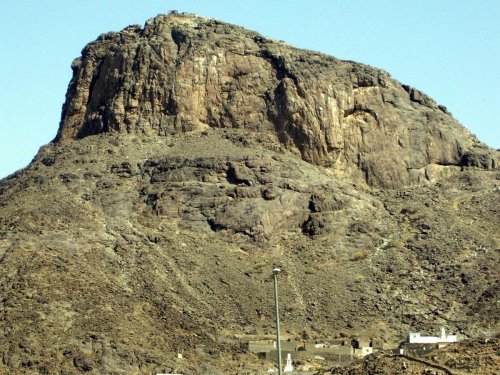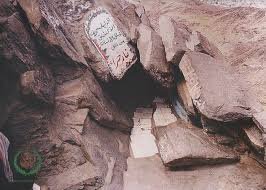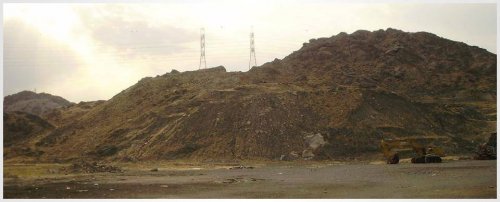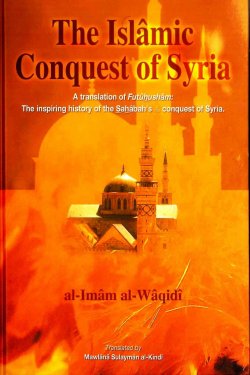-
Posts
8,434 -
Joined
-
Days Won
771
Content Type
Profiles
Forums
Events
Everything posted by ummtaalib
-
Shayba Abee Taalib It is situated close to the tunnels leading to MIna approximately 200 metres from Jaba-e-Qubais, where there is a small bus stand. At this place Rasoolullaah sallallaahu 'alayhi wasallam took refuge for three years with the Believers during the Boycott. When Islam began to spread the Makkans asked Abu Talib, the uncle and protector of the Prophet (peace and blessings of Allah be on him), to hand him over to them for execution but he steadfastly refused. Abu Talib acted fast and called on the members of Banu Hashim and Banu al-Muttalib to meet at the Ka’bah and convinced them to pledge that they would protect their clansman, Muhammad (peace and blessings of Allah be on him). Abu Lahab, another of the Prophet’s uncles and self-proclaimed sworn enemy, refused to take the pledge and declared he was on the side of the Quraysh. The Quraysh held a meeting and decided to outcast the Banu Hashim and Banu al-Muttalib by placing them under a total social boycott. The other clans from the Quraysh would not marry their daughters, transact business with them, keep company with them, nor would they accept any peace overtures from these two clans until they handed over the Prophet (peace and blessings of Allah be on him). Once all the people present had agreed with the points mentioned above, Baghid bin Amir bin Hashim put this pact in writing. The Quraysh chiefs signed this document and the parchment was hung in the Ka’bah in order to give it authority. This was done on the 1st Muharram, in the seventh year of the Prophet’s (peace and blessings of Allah be on him) mission. When the deed was done, Baghid’s hand, or at least some of his fingers, became paralyzed. The Prophet (peace and blessings of Allah be on him), along with Abu Talib and and clan memebers of Banu Hashim and Banu al-Muttalib were forced to withdraw from Makkah and live in She’b Abi Talib, which was a subsection of one of the gorges that ran down to Makkah. The boycott was devastating and for many months they lived in misery. It was so rigorously applied and food was so scarce that they had to eat the leaves of trees. The women, and more specially the children and suckling babies would cry with hunger which could be heard all over the valley. The Quraysh told the merchants not to sell any goods to them. Prices were increased to prevent them from buying even essentials. They remained in that state for three years. Apart from some kind Qurayshi people who secretly sent food to them they were totally abandoned. Despite such grim circumstances, the Prophet (peace and blessings of Allah be on him) never ceased inviting non-Muslims to Islam. He was particularly active during the time of Hajj. It was at this time that he would speak to tribes that had travelled to Makkah from all over the Arab world. A group of fair-minded Quraysh, led by Hisham ibn ‘Amr, hated this unfair boycott. Hisham was highly respected among his people. He contacted some men of the Quraysh whom he knew to be kind-hearted and considerate. He told them it was shameful to allow such tyranny to continue and asked them to abandon the unjust contract. When he had persuaded five men to agree, they met togather to work towards this end. When the Quraysh were assembled the next day, Zuhayr ibn Abi Umayyah, whose mother was the aunt of the Prophet (peace and blessings of Allah be on him), faced the people and demanded, “People of Makkah! Do we eat and clothe ourselves while the Banu Hashim are perishing, unable to buy or sell? By Allah, I will not sit down until this unjust document is torn up!” Abu Jahal became suspicious of the sudden rebellion but Abu Talib saw his opportunity to step in. He had come into the precincts of Ka’bah to tell the Quraysh that the Prophet (peace and blessings of Allah be on him) had received a revelation about the fate of the wicked parchment. He stood up, and facing the Quraysh, told them that Allah had revealed to the Prophet (peace and blessings of Allah be on him) that termites had eaten the parchment inside the Ka’bah. The only thing that remained of the document, Abu Talib said, were the words “In Your Name, O Allah.” Abu Talib then challenged the Quraysh, saying that if the Prophet’s claim turned out to be false, he would no longer stand between them and the Prophet (peace and blessings of Allah be on him). However, if the Prophet had spoken the truth, the Quraysh should end the boycott. The Quraysh accepted Abu Talib’s challenge. When Mut’im bin Adiy rose to retrieve the parchment, the assembly saw that it had been destroyed. Its only remaining words were “Bismika Allahumma” (In Your Name, O Allah) and Allah’s name. Allah (Glorified and Exalted is He) had given the Quraysh yet another sign but once again they refused to admit their error and accept Islam. Their only concession was to end the boycott. The Prophet (peace and blessings of Allah be on him) and his Companions came out of the mountain pass and were allowed to live in Makkah once again. References: When the Moon Split – Shaikh Safiur-Rahman Mubarakpuri, Fazail-e-Aamal – Sheik Zakariyya Kandhalvi, Muhammad the last Prophet – Sayyed Abul Hasan Ali Nadwi islamiclandmarks
-
Jannatul Ma'laa The picture shows Jannatul Ma’la, the principle historical graveyard in Makkah which is located in a valley east of the Masjid ul Haram. Several members of the Prophet (s.a.w.)’s family (INCLUDING Khadeejah (Radhyallaahu 'nhaa) and many Sahabah (r.a.) are buried here.It is the greatest graveyard after Jannatul Baqee in Madinatul Munawwarah. (From Al-Miskeenah) An historic photo of how Mu’alla was before the demolition of the tombs. The main central tomb was of Ummul Mu’mineen Khadijah RadhiAllahu anha. Others known to be resting here include Abd Manaf, the great, great-grandfather, Hashim the great-grandfather, Abdul Muttalib the grandfather and Qasim the son of the our Prophet SallAllahu alaihi wasallam. Another closer view of the tomb of Ummul Mu’mineen Khadijah RadhiAllahu anha Now The graves of the notable predecessors are behind the green gate and grills while others are placed in walled areas as such…quite different from Jannatul Baqee in Madinah The Graveyard where Daughters were buried alive in the time of Jahiliyyah It is situated outside the Haram in front of Bab-e-Fahad. It is under the bridge of the road leading to Jeddah. Small of small graves can clearly be seen in a four-walled compound. "Women's Guide to hajj and Umrah"
-
Al-I'tidaal (Islamic Politics) By Shaykh Muhammad Zakariyyah Kandhelwi A book dealing with all major issues faced by the Ummah around the world.The book provides not only the answers to the problems we are facing but also served as a guide according to which a Muslim's life can be conducted. itidal.pdf cetral-mosque
-
Uswai Rasool Akram The Ways of the Prophet Muhammad sallallaahu 'alayhi wasallam by Dr. Abdul Hai A compilation of the complete way of life of our beloved Prophet Muhammad sallallaahu 'alayhi wasallam. His Traits and Character Ways and Manners His Worship & A compilation of the Rights & Social Etiquettes List of Du'as for Various Occasions and much more
-
Bani Israel and the Muslim Ummah by Shaykh-al-Hadith Fazlur Rahman Azmi BaniIsraelAndTheMuslimUmmahbyShaykhAl-hadithFazlurRahmanAzmi.pdf
-
Words & Reflections of Mawlana Muhammad Ilyas (Rahmatullaahi 'alayhi) by Mawlana Mazoor Nu'mani HERE
-
Importance of Hajj If a person has wealth which is over and above his basic necessities and which will be sufficient for him to make the onward and return journey for hajj, then hajj becomes fard upon him. There are great virtues in performing hajj. Rasulullah sallallahu alayhi wa sallam said: "There is nothing in return for a hajj that is free of sins and evils except paradise." Similarly, great rewards have been mentioned for performing umrah. Rasulullah sallallahu alayhi wa sallam said: "Hajj and umrah wipe out sins just as a furnace removes the rust that has settled on steel." Warnings for Not Performing Hajj (When it becomes Compulsory) Severe warnings have been mentioned with regard to the one who does not perform his hajj despite it being fard upon him. Rasulullah sallallahu alayhi wa sallam said: "The person who has food, drink, and the means of transportation in order to undertake the journey of hajj and still does not go - Allah Ta'ala has no concern if the person dies as a Jew or a Christian." He has also said that the abandoning of hajj is not the way of Islam. From Bahishti Zewar by Shaykh Ashraf Ali Thanwi (حديث مرفوع) حَدَّثَنَا سَلَمَةُ بْنُ شَبِيبٍ , قَالَ : ثنا عَبْدُ الرَّزَّاقِ , قَالَ : أنا الثَّوْرِيُّ ، عَنْ إِسْمَاعِيلَ ، عَنْ فُضَيْلٍ ، عَنْ سَعِيدِ بْنِ جُبَيْرٍ ، عَنِ ابْنِ عَبَّاسٍ رَضِيَ اللَّهُ عَنْهُمَا , قَالَ : قَالَ رَسُولُ اللَّهِ صَلَّى اللَّهُ عَلَيْهِ وَسَلَّمَ : " تَعَجَّلُوا إِلَى الْحَجِّ ، يَعْنِي الْفَرِيضَةَ ، فَإِنَّ أَحَدَكُمْ لا يَدْرِي مَا يَعْرِضُ لَهُ " Sayyidina Rasul-ullah (Sallallaho Alaihe Wassallam) said, Hasten to do Hajj, for no one of you knows what will happen to him." من مات ولم يحج وله جدة فلا عليه أن يموت يهوديا أو نصرانيا Sayydina Umar ibn al-Khattaab (RA) said, “Whoever dies without having done Hajj when he had the means to do so, he might as well die as a Jew or as a Christian.” Rulings Regarding Hajj (Bahishti Zewar) 1. Hajj is fard at least once in a life time. If a person performs the hajj several times, the first one will be regarded as fard and the rest will be regarded as nafl hajj. There is also great reward in offering nafl hajj. 2. Hajj that is offered before one can reach the age of maturity is not considered. If a person is rich, hajj will become fard upon him once he reaches the age of maturity. The hajj that he performed before maturity will be regarded as nafl hajj. 3. Hajj is not fard on a blind person irrespective of how rich he may be. 4. Once hajj becomes fard on a person, it becomes wajib on him to go for hajj in that very year. It is not permissible to delay in performing the hajj without a valid reason. It is also not permissible for a person to think that he is still young and that there is still plenty of time to perform the hajj. If a person delays in performing his hajj and performs it after a few years, his fard duty will be fulfilled but he will still be regarded as a sinner. 5. If a woman is going on hajj, it is necessary for her to be accompanied by her husband or some other mahram. It is not permissible for her to go on hajj without a mahram. However, if a woman lives within 77 kilometres of Makkah, it is not necessary for her to go with her husband or a mahram. 6. If the mahram has not reached the age of maturity, or he is so irreligious that he cannot even be trusted with his mother, sister, etc. it will not be permissible to travel with such a mahram as well. 7. Once a woman finds a reliable mahram, her husband cannot prevent her from going on hajj. Even if he prevents her from going, she should not pay any heed to him and she should continue on her journey. 8. A girl who is on the verge of reaching the age of maturity cannot go for hajj without a shar'ee mahram. She cannot even go alone. 9. If a mahram takes a woman for her hajj, all his expenses will have to be borne by the woman. It is wajib upon her to pay him for all his expenses. 10. If a woman cannot find a suitable mahram throughout her life, she will not be sinful for not performing her hajj. However, at the time of her death it is wajib on her to make a bequest that hajj be performed on her behalf. After her death, her inheritors should find someone to perform the hajj on her behalf. The expenses for this hajj should be paid from the money that she left behind. In this way she will be absolved of the duty of performing hajj. This type of hajj is known as hajj-e-badal. 11. If hajj was fard on a person but he delayed performing it until such a time that he became blind or became so sick that he is unable to undertake the journey, then he will also have to make a bequest for hajj-e-badal. 12. If a person dies, leaving behind so much of wealth that after paying all his debts, there is sufficient money to pay for the hajj-e-badal from one third of his wealth, then it is wajib on the inheritors to fulfill his bequest for hajj-e-badal. But if the money is so little that hajj-e-badal cannot be made from one third of his wealth, then the person's relatives should not undertake to have the hajj performed. The inheritors could also take the entire one third for the purpose of hajj-e-badal and supply the balance of the money from their own side so that the hajj-e-badal could be made. In other words, they should not give more than one third from the wealth of the deceased person. However, if all the inheritors happily agree to give their share of the inheritance for the performance of hajj-e-badal, it will be permissible to use more than one third of the wealth of the deceased. However, the permission of immature inheritors is not considered in the Shariah. Therefore, no money should be taken from their share. 13. A person made a bequest for hajj-e-badal and thereafter passed away. However, the wealth that he left behind was very little and hajj-e-badal could not be made from the one third. In addition to this, the inheritors refused to forego their shares in order for the hajj-e-badal to be performed. Bearing all this in mind, if the hajj is not performed, there will be no sin on the deceased. 14. The same rule applies to all bequests. If a person had many fasts to keep, many salaats to make qada of or some zakaat to be given, he therefore made a bequest for all this and passed away, then all these payments will have to be made from the one third. It is not permissible to use more than one third without the permission of all the inheritors. 15. If a person did not make a bequest for hajj-e-badal, it will not be permissible to do so by using the money which he had left behind. But if all the inheritors agree to this, it will be permissible. Insha Allah, the obligation of hajj will be fulfilled. But it should be borne in mind that the permission of an immature inheritor is not considered. 16. If a woman is in her iddah, she cannot go for hajj. 17. If a person has sufficient funds for the onward and return journey to Makkah but not sufficient enough to visit Madinah as well, hajj will still be fard upon him. Many are of the incorrect opinion that as long as you do not have sufficient funds to go to Madinah as well, hajj does not become fard. This notion is absolutely wrong. 18. When a woman is in her ihraam, she cannot cover her face in such a way that the piece of cloth touches her face. These days, a latticed screen or fan is available for this purpose. It should be tied to the face with the screen in line with the eyes and with the burqah worn loosely above it. This is permissible. 19. The rules and regulations of hajj cannot be understood and remembered without really going on hajj. On going for hajj, one is taught all the rites of hajj, etc. We therefore do not feel it necessary to enumerate these rules and regulations. Similarly, the method of performing umrah can be learnt by going to Makkah.
-
Jabale Noor (Mountain of Light) Jabal al-Noor is located in the Hejaz region of Saudi Arabia, just outside of Mekkah. Jabal al-Noor translates to “Mountain of Light.” Prophet Muhammad (peace and blessings be upon him) received his first revelation from Allah (the Glorified and Exalted) through Angel Jibreel (Gabriel) in the Hira cave which is on this mountain. Prophet Muhammad (peace be upon him) used to climb this mountain often even before receiving his fist revelation from Allah (the Glorified and Exalted). Cave of Hira The Cave of Hira is situated two miles away from the holy city of Mecca in Jabl al Nur. It is a small cave with about 3.5 meters long and 2 meters wide. The cave was Allah’s apostle (peace and blessings of Allah be upon him) place for mediation. It was in this cave that Angel Gabriel revealed the first divine revelation. Here Gabriel appeared for the first time to order him to read. However, his reply at that time was “ I cannot read” . “Read! In the Name of your Lord, Who created, created man from a clot. Read! and your Lord is the Most bountiful, (he who taught) the use of pen taught man which he knew not.” (Al-Qur'an 96:1-3) Jabale Thaur It is in this mountain that the houses the cave where prophet Muhammad (peace and blessings be upon him) and Abu Bakr (may Allah be pleased with him) stayed for three days and nights fleeing persecution from the Quraysh during their migration to Medinah. The mountain is at the southern end of Mecca and rises about 760 meters above sea level Cave of Thaur During the Prophet’s migration (“hijrah”) from Makkah to Madinah with his companion, Abu Bakr as-Siddiq (may Allah be pleased with him), they were being pursued by the Quraish who were attempting to harm him. The two hid in a cave in the mountain of Thaur for three days, until their pursuers had given up looking for them and returned to Makkah. Then, the Prophet and Abu Bakr continued their journey to Madinah. It was narrated from Anas that Abu Bakr (may Allah be pleased with them both) told him; “I was with the Prophet (peace be upon him) in the cave, and I saw the footsteps of the ‘mushrikun’. I said, ‘O’Messenger of Allah, if one of them were to lift his foot, he would see us.’ He (peace be upon him) said, ‘What do you think of two people when Allah is the third one with them?’ ” [Al-Bukhari (4663)]
-
Life and Mission of Maulana Muhammad Ilyas (Founder of Tabligh-e-Jamaat) by Sayyed Abul Hasan Ali Nadwi Tablighi Movement was started by Maulana Muhammad Ilyas (1886-1994) in 1927 among the Meos of Mewat region south of Delhi, India. This movement was a response to degeneration and degradation of the Muslims in India. The maulana had realised that the Muslims were drifting away from the basics of Islam so there was a need for a teaching vehicle aimed at the vary basics His Motto was 'Aye Musalmano, Musalman bano' (Muslims, become Muslims). He began reforming them through six basic articles: 1) Understanding the true Meaning and Purpose of the first Kalimah (there is no god but Allah and Muhammad is His messenger), 2) Salah (Namaz) (offering five-times daily prayers) 3) Ilm (acquiring knowledge) & Dhikr (remembrance of Allah) 4) Ikram-e-Muslim (respect for Muslim) 5) Ikhlas-e-Niyat (faithful intention) and 6) Tabligh (spreading the message of Allah) Enjoining the Good and Forbidding the Evil The Tabligh Movement is Probably the Largest Organised Muslim Movement in the World Today, it's yearly Ijtema's (Gatherings) can attract hundreds of thousands of people. Although most Tabligh members are Indian, Pakistani or Bangladeshi, but the Ijtema now attracts believers from the Middle East, Turkey, and from as far afield as Japan, western Europe and north America. The Author Sheikh Syed Abul Hasan 'Ali Nadwi, one of the most prolific writers and original thinkers of our time, author of well over fifty books in various languages, and a scholar of rare distinction, passed into the mercy of Allah in December 1999. The Maulana was a founder member of the Muslim World League (Rabita), a member of the Organisation of Islamic Conference (OIC), a member of the World Supreme Council of Mosques, and a member of the Fiqh Council of Rabita. He was also a member of Advisory Council of the Islamic University of Madinah al-Munawwarah, a member of its Supreme Council, and a member of the Academy of Arts and Letters of Damascus, Syria. He was also a founder member of the League of the Islamic Literature in India. Perhaps better known as the founder member and first rector of Nadwatul Ulama (India), and president of the Academy of Islamic Research and Publications. Read Here
-
One Day In Tablighi Jamaat (Dawah, Taleem-o-Ta’allum, Tazkiyya, Khidmat) Selected writing of Shaykh Abul Hasan Ali Nadvi R.A with Quotes and writing of other scholars in Appendix Teaching and Learning of deen and its effort is integral part of muslim life. It is very clear from Quran and Hadith that following is a parts and parcel of a Muslim life. 1. To learn deen for oneself and to practice it in life. 2. To Teach deen (Islamic Knowledge and Practice) to others 3. Encouraging for good and advising to stop from bad 4. Striving for the Spread and Propagation of deen. These all should be parts of a Muslim life. In the era of prophet and early generation of Muslim people of all walk of life i.e Farmers businessman rich or poor used to spare some time for learning and teaching deen. READ
-
Imam Waaqidee's Conquest of Syria (Translated by Mawlana Sulayman al-Kindi) The Inspiring History of the Sahaaba's (RA) Conquest of Syria An Awesome, Inspiring Read!! You'll be with the Sahaaba in the battlefield hearing their cries of "Laa hawala walaa quwwata illaabillaah" and their cries of anguish as companions fell "Innaalillaahi wainnaa ilayhi raaji'oon" spurring them on as city after city fell with locals begging the Muslims to conquer their unjust rulers! TRULY AWE-INSPIRING READ
-
Stories of the Prophets Sayyed Abul Hasan Ali Nadwi The Prophet Nuh The Prophet Hud The Prophet Salih The Prophet Ibrahim 38 The Prophet Yusuf The Prophet Musa The Prophet Shu'ayb The Prophets Da'ud and Sulayman . . . . . The Prophets Ayyub and Yunus . . . . . . . The Prophets Zakariyya and Yahya . . . . . TheProphet 'Isa ibn Maryam DOWNLOAD HERE
-

Character Of The Prophet (Sallallaahu 'alayhi Wasallam)
ummtaalib posted a topic in Seerah & History
CHARACTER OF THE PROPHET S.Abul Hasan ali Nadwi The fundamental reason for the prophethood of Muhammad (peace be upon him) and its beneficial impact on humanity have been explicitly set forth in the Book of God. "Thus we have sent forth to you a messenger from amongst you, who recites to you Our revelations and purifies you and teaches you the Book and wisdom, and teaches you what you were not wont to know." (2: 151) characteroftheprophet.pdf -
Patience and Gratitude By Ibn Qayyim al-Jawziyyah What scholars have said about patience Different degrees of patience Obligatory patience (wâjib) Encouraged patience (mundûb) Forbidden patience (mahdhûr) Disliked patience (makrûh) Permissible patience (mubâh) & A Lot More
-
Majaalis of 'Hadratjee' Hazrat Moulana Maseehullah Khan Saheb (R.A.) A senior khalifa of Hazrat Moulana Ashraf Ali Thanwi (R.A.) This century has been fortunate to see such pious predecessors such as Hazrat Maseehullah Khan Saheb (R.A.).'Hadratjee', as commonly known to many, has been responsible for the spiritual reformation ('Islaah') of thousands throughout the globe. A very praiseworthy favour has been rendered by Dr. Ismail Mangera Saheb of Crosby,Johannesburg, South Africa who has pain-stakingly compiled and translated the Majaalis of 'Hadratjee' from Urdu to English.This series is called 'FOR FRIENDS'. A series of discourses of Maseehul Ummat Hadhrat Maulana Maseehullah Khan Saheb have been recorded on tape. His unique approach to our Deen in this day and age, make these discourses invaluable to that Muslim who wishes to live a life seeking the Pleasure of Allah Ta'ala. A number of people have felt that there is a great need for these discourses to be available to the English reader. This humble servant has made an attempt at translating one such discourse from the Urdu. InshaAllah, attempts will be made with other discourses as well. The phrase that comes to mind is, "fools rush in where angels fear to tread." The dictionary meanings of "dost" is "friend; lover". Which is applicable? Thinking about it, both are applicable. DOWNLOADS Up to Part 13
-
Riyadh as-Saaliheen (The Gardens of the Righteous) by Imam Nawawi (RA) One of the most trusted and comprehensive collections of Ahadeeth on virtues in Islam by Imam Abu Zakaria Mohiuddin Yahya Ibn Sharaf al-Nawawi Ash-Shaf’ae (RA) Read Here OR DOWNLOAD
-
Pearls from the Path Part 2
-
Pearls from the Path A Compilation of Fascinating Stories and Anecdotes from Islamic History Compiled by Moulana Afzal Ismail Pearls from the Path is a collection of relevant and thought provoking incidents gathered from the books of Islamic history. A rich collection of stories with powerful lessons for everyone, Pearls from the Path will ignite your passion for Islamic history and illustrate the priceless heritage that Muslims have left for all of mankind. Discover amazing tales of heroism and bravery, marvel at the lengths that the scholars of old would go to in order to gain knowledge, be amazed at the trials that pious men have faced, and take heed from the mistakes of men through the ages. Adults can learn valuable lessons that will help them navigate the complex modern world, while the youth will learn that history has an important place in both the present and the future. Whether you want to expand your existing knowledge or introduce your family to the wonders of their Islamic heritage, this compilation of short stories will serve as an invaluable resource. For those interested in Islam, or who want to know more about Islam as a way of life, Pearls from the Path serves as an effective bridge towards the understanding of Islam and Muslims. READ ONLINE
-
Service to her mother-in-law: Towards the end of her life, her mother in-law would experience severe bouts of diarrhoea due to which she would soil three or four sets of clothes daily. Although her husband (Moulana Qaasim rahimahullah) would insist that he would wash these clothes himself, she would want to wash it. Finally the husband and wife came to an agreement that they would take turns, one day Moulana would wash the clothes, and one day she would wash them. Despite this agreement, when it was the turn of Moulana, this great woman would wash most of the clothes herself and dry them before Moulana could come home. She would only leave one garment for him to wash. (Sawaanihe Qaasimi vol.1, pg. 502) Lesson: Khidmah (service) brings honour, respect, love and great blessings. Khidmah does involve some sacrifice. However this little “pain” brings very great gain. When one tries to avoid such “pain” in the service of one’s husband and family, it unfortunately brings greater pain in various ways.
-
Service to her husband: She says: “My husband (Moulana Qaasim rahimahullah) would generally drink some milk at night prior to sleeping. When he returned home after esha, I would present the milk to him. He would drink the milk and then engage in nafl salaah. If he did not wait for me and commenced his salaah, it meant that he was upset with me for some reason. Thus it happened a few times that when I arrived with the milk he had already commenced his salaah. He would normally stand for the entire night in salaah. Thus I too remained standing the entire night with the cup of milk in my hands. (Sawaanihe Qaasimi vol.1, pg. 518) Lesson: Subhanallah! She could have left the milk and gone to sleep, or even refused to bring it in future. However, she knew better. She did what was indeed better. Allah Ta’ala blessed her with something much, much better than most women. Thus we are today discussing her life with awe and amazement.
-
Disinterest in the material: She was the daughter of a wealthy man of Deoband. Her father sent her off with much clothing, jewellery and household accessories. When the husband and wife met for the very first time, Moulana won his wife’s confidence and then addressed her thus: “Now that Allah Ta’ala has joined us, there has to be compatibility between us. However in our present condition this seems difficult, since you are so wealthy and I am poor. We have one of two options. Either I become wealthy, which is obviously difficult. The other option is that you become poor like me.” Without any hesitation this great woman happily said to Moulana: “I give you the full right to do as you please with my belongings.” The next morning Moulana contributed all that jewellery and wealth in the path of Allah Ta’ala. After some time she went to her parent’s home. When her father noticed that she was not wearing any jewellery, he asked her the reason for this. She explained to him the entire incident. Her father did not object at all. However he considered it inappropriate that his daughter should appear before the other relatives in this manner. Since he was very wealthy, he gave her everything once more. When she returned home, Moulana Qaasim (rahimahullah) observed that she had come back once again with much clothing, jewellery etc. That night he again encouraged her regarding the Hereafter, etc., and she again gave him the right to do as he wished. The next morning, for a second time, all the valuables were spent in the path of Allah Ta’ala. Some may feel sorry for this woman that she had to part from all her wealth. However, in reality it was a great favour of Moulana upon her that he had completely removed the love of the world from her heart. She would herself say: “The love for wealth and jewellery has totally left my heart. In fact I have even built up an aversion to these things, and in my entire life thereafter I have never had a desire for expensive garments.” (Sawaanihe Qaasimi vol.1, pg. 507) Lesson: Happiness is not in material possession. She could have demanded to keep her things. Yet she chose to suppress her feelings in order to please her husband. She accepted his suggestion and sacrificed all her wealth. Allah Ta’ala made her happy in return. One of the major reasons for her happiness was that, with the blessing of her sacrifice, she became unshackled from the glitter of wealth, jewellery, etc. The chains of the love for material things had broken. Now she was free. She was no more grieved if she did not have an expensive garment, or that glittering diamond, or some fancy furniture, etc. Her heart was not torn by the things that have become old or worn out. She was indeed content and free. A free person is happy.
-
Desire for learning deen: Her grandson, Qari Muhammad Tayyib (rahimahullah), says: “When I commenced my studies of hadeeth, I would come home after my lessons and explain the entire lesson to my grandmother who would listen to it with tears continuously flowing from her eyes. This happened for two years.” (Sawaanihe Qaasimi vol.1, pg. 519) Lesson: Those whose hearts are clean gain tremendous enjoyment and benefit from the recitation of the Quraan Majeed, reading or listening to the ahaadeeth of Rasulullah (sallallahu alaihi wasallam) and other righteous actions. They do not then need to look for any artificial and false pleasure.
-
Attachment to worship: Immaterial of what work she may be involved in, once she would hear the muazzin saying “hayya alas salaah” she would leave everything and get up for salaah. Every morning after fajr salaah, she would cover her face with her scarf and engage in the zikr of Allah Ta’ala with great amount of punctuality. She would never miss this under any condition. (Sawaanihe Qaasimi vol.1, pg. 519) Lesson: Those whose hearts are attached to Allah Ta’ala are unable to continue doing anything else when the time to stand in front of their Master has come. She practically imparted the lesson that salaah is the most important aspect in a believer’s life. Furthermore, her punctuality in zikr obviously contributed very greatly to her high rank and position. Zikr is the food for the heart. Just as a person who has not eaten food for a few days will become extremely weak and even bed – ridden, likewise the one who starves his/her soul by not engaging daily in zikr will become spiritually very weak. Gradually such a person will lose all interest in righteous actions and many sins will creep in her life.
-
wa'alaykumus alaam ww ok at Amazon: http://www.amazon.co.uk/Womans-Guide-To-Hajj-Umrah/dp/095569731X at kitaabun.com: http://kitaabun.com/shopping3/product_info.php?products_id=2069 at azharacademy: http://www.azharacademy.com/scripts/prodView.asp?idproduct=1867 same price everywhere
-
Wa'alaykumus salaam ww Tried looking for it but could not find it ) : I have the book and its brilliant. In fact I havn't seen anything as comprehensive in English regarding the situations which a woman can be in during Hajj

